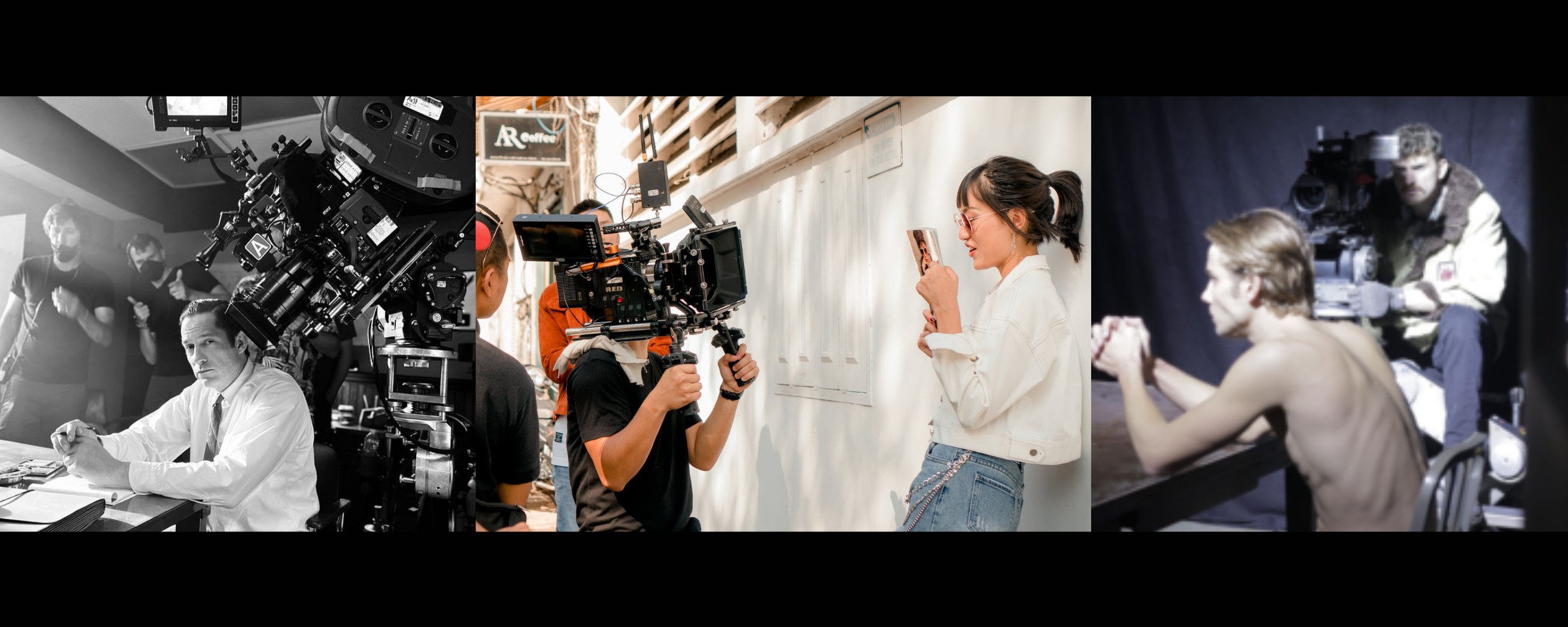LEARN TO ACT ON-SCREEN AT ONE OF THE BEST ACTING SCHOOLS
Is filmmaking and conveying stories through film your passion? Study in one of the best film and acting schools in California. We are considered one of the top film colleges in LA, Learn Filmmaking and how to create films in a class. The emphasis is on hands-on experience. Students gain invaluable experience directing and shooting their own films and serving as integral crew members on other students’ films. In their numerous projects, students take on roles such as director, cinematographer, writer and editor and experience first-hand what it’s like to be a part of a film production. Each student will write, shoot, direct and edit her/his own films.
“The best way to become a filmmaker is to simply start making films.”
LEARN FILMMAKING AT ONE OF THE BEST FILM SCHOOLS IN THE U.S.A.
Associate Degree of Occupational Science in Fine Arts and Filmmaking
Film Directing Program Classes

1st Semester
Course Title: Improvisation – Beginner/Intermediate
In this class, students learn the core principles of starting and sustaining a strong improvised scene lasting 3 to 5 minutes. The focus is on bypassing overthinking and tapping into natural impulses by embracing a “yes, and…” mindset. Through these exercises, students will learn to trust their instincts and let their imagination lead the way, building confidence and spontaneity in performance.
Course Title: Acting Technique: Meisner
This course introduces students to the foundational principles of the Meisner Technique through improvisation and scene work. Emphasis is placed on fully inhabiting imaginary circumstances and responding truthfully in the moment. Students will enhance their independence as actors, develop stronger rehearsal habits, and refine both vocal and movement techniques. Enrollment is limited to ensure individual attention and growth.
American Film History
Students will learn all about the history of film—how filmmaking began, how various techniques evolved over time, and how Hollywood emerged as the center of the film industry.
Meisner Class
Students explore Sanford Meisner’s technique, focusing on:
-
Repetition exercises
-
Listening deeply
-
Getting into character truthfully
This practical approach helps actors develop instinctive, reactive performances.
Storyboarding / Cinematography
This class offers hands-on experience with:
-
Cameras and lighting equipment
-
Techniques in exposure, f-stops, focal length, and composition
-
Digital cinema workflows
-
Color correction fundamentals
A must for students wanting to understand the technical aspects of visual storytelling.
Directing Theory
Structured as a lecture/workshop hybrid, this course covers:
-
Fundamentals of directing
-
Text analysis and casting
-
Audition processes and collaboration
-
Principles of blocking, composition, and motivation
With exercises, assignments, and directing projects, students gain practical experience in the art of storytelling from a director’s perspective.
Film & Script Analysis
Students will:
-
Analyze film themes
-
Break down scenes
-
Be assigned roles and directed in class
-
Discuss the directorial vision behind every scene
A great course for actors and directors alike to understand narrative structure and performance.
Writing a Short Movie
In this class, students explore the short narrative script through:
-
Writing exercises and assignments
-
Learning how to outline stories
-
Discussing short films and their structure
-
Using symbols, metaphors, allegories, and more to enrich storytelling
Golden Box Workshop
This intensive workshop equips each student with a broad range of acting tools, helping them:
-
Access emotional triggers quickly and reliably
-
Communicate effectively with scene partners
-
Endow objects with meaning and create emotionally rich characters
The course provides a comprehensive overview of major acting methodologies, including:
-
Sanford Meisner
-
Lee Strasberg
-
Stella Adler
-
Bobby Lewis
-
Michael Chekhov
-
Konstantin Stanislavski

2nd Semester
Filmmaking & Directing Courses at the Los Angeles Acting Conservatory
Directing Actors: Scenes
This class focuses on how to work with and talk to actors. Students will learn how to build a collaborative relationship between director and actor to achieve the maximum creative journey.
Pre-Production
Students will:
-
Apply what they’ve learned from writing a short film
-
Create characters and an outline
-
Begin developing a full-length feature screenplay from start to finish
They will also have the opportunity to cast actors from the acting program for table readings and receive feedback in class.
Filming a Short Film
The time has come—you’re on set and filming!
In this class, filmmakers will:
-
Discover what feels natural and what presents challenges
-
Learn that they are the point person for everything on set
-
Answer constant questions and make quick decisions
-
Be tireless, adaptable, and inspiring to their cast and crew
This phase tests your leadership and your ability to execute your vision.
From Editing to Post-Production
Students will:
-
Watch the dailies
-
Select the best takes and piece together their first cut
-
Receive feedback, revise, and create a stronger final version
They will also learn:
-
How to pick and add music
-
Perform color correction and sound design
-
Add visual effects, if the film requires it
Producing a Web Series
In this class, students will:
-
Write, produce, and shoot a web series
-
Understand the differences between writing a series vs. a feature film
-
Learn how to stretch out a story across episodes
Directing a Web Series
Students will explore:
-
All essential elements of directing a web series
-
The logistical and creative aspects of filming episodic content
-
Best practices for bringing consistency across multiple episodes

3rd Semester
Stanislavski Technique
This class focuses on:
-
Effective memory
-
Using sensory and emotional recall
-
Triggering authentic emotions through personal memories
Through scenes and monologues, actors will learn to:
-
Draw from themselves deeply and personally
-
Trust substitutions and personalizations that arise
-
Understand that the more personal a performance is, the more universal the story becomes
Directing on Camera
This class offers:
-
Hands-on experience working with actors in a low-pressure environment
-
Students (aspiring filmmakers) will:
-
Pick a scene
-
Cast it from actors in the acting program
-
Direct the scene — the exercise will be repeated twice
-
Stage Combat Filming
In this course:
-
Students will practice safe fighting techniques
-
Learn stage combat on set and on stage
-
Study and execute choreographed fight scenes
Directing Scenes
This class emphasizes:
-
How to work with and talk to actors
-
Facilitating strong collaboration between director and actor
-
Achieving a maximum creative journey through effective communication
Improv
In this course, students will:
-
Continue developing their improvisational skills
-
Learn to sustain an improvised scene for 5 to 8 minutes
-
Instantly step into and inhabit a character, allowing for freeform play
Film & Script Analysis
Students will:
-
Discuss and analyze movie themes
-
Assess scenes in class by assigning them to actors
-
Watch directors direct actors, asking in-depth questions during the process
Music Video
In this class, students will:
-
Learn to shoot a music video
-
Apply filmmaking and directing skills developed in earlier projects

4th Semester
Course Title: Acting Technique – Strasberg
This class introduces students to the core of the Strasberg Method. Each session begins with a series of concentration exercises designed to promote relaxation and build effective memory—both sensory and emotional. Using imaginary everyday objects, students engage in sense memory work to develop a grounded, believable reality on stage. The second half of the class focuses on scene and monologue work, where students apply the techniques learned in the exercises directly to their roles. Improvisation is also used to generate genuine emotional experiences and deepen character development.
Production Design is an examination of the role of the production designer and art director in motion pictures, television or new media. Students will learn what art direction brings to the narrative storytelling process and how to identify this while watching a film or television show. They will work on projects that will give them hands on experience at the design process solving real world problems with skills they learn in class.
Production Design is an examination of the role of the production designer and art director in motion pictures, television or new media. Students will learn what art direction brings to the narrative storytelling process and how to identify this while watching a film or television show. They will work on projects that will give them hands on experience at the design process solving real world problems with skills they learn in class.
Make a Movie Part 1 – Pre-Production
Make a Movie Part 2 – Proof of Concept
Students will watch the dailies, select the best takes, and piece together what will be their first cut. They will get feedback, go back to the drawing board, and do another cut. They will learn how to pick and add music, do color correction and sound design, and create visual effects if the film requires any.

Electives
Industry Essentials: Film & Acting Support Courses
Art of the Pitch
Students will learn how to:
-
Pitch their project effectively—a critical skill when seeking funding and professional support
-
Understand what elements are essential in a compelling pitch
Casting
This course provides:
-
Tips and strategies for successful casting
-
Insight into what casting directors look for and how to increase your chances of being cast
Outline Treatment
In this class, students will learn how to:
-
Present the story of their script in just a few pages
-
Include character descriptions and structural elements in a concise, readable format
Production Design
A hands-on exploration of:
-
The role of the production designer and art director in film, TV, and new media
-
How art direction supports storytelling
-
Projects that give students real-world experience solving design challenges through learned skills
-
Training to identify visual storytelling techniques while watching media
Accent Reduction
This course helps students:
-
Learn a typical American accent, crucial for film roles
-
Practice tongue and jaw relaxation exercises that have proven successful for many actors
-
Improve clarity and authenticity in spoken English for on-camera performance
Accent Reduction
In this class, students will learn a typical american accent, which is very important for movie roles. We will show them different exercises to loosen the tongue and jaw which is helping a lot of students.

